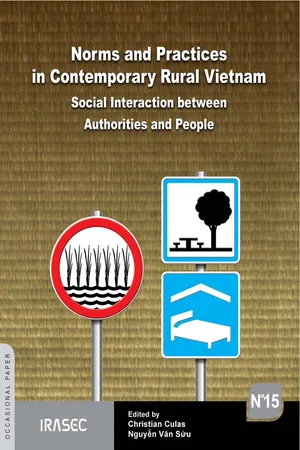
Norms and Practices in Contemporary Rural Vietnam
Social Interactions between Authorities and People
- English
- ePUB (mobile friendly)
- Available on iOS & Android
Norms and Practices in Contemporary Rural Vietnam
Social Interactions between Authorities and People
About this book
Since the 1980s, while trying to maintain political stability and territorial integrity, the Vietnamese state has strongly moved towards the transformation of a centrally-planned economy to a more market-oriented model, in which private, foreign and joint-venture businesses are increasingly becoming the key pillars of the national economy. Another key aspect of the ??i M?i's agenda was a fundamental shift in the party-state's foreign relations policy toward a normalization of Vietnam's diplomatic and trading relations with China, the United States, and other countries since the early 1990s. Over twenty years after the ??i M?i renewal renovation, Vietnam has been praised by various domestic and international institutions for its "impressive" achievements in socio-economic development and poverty reduction and for its gradual liberalization and market diversification, coupled with its commitment to equality. Consequently, this has changed the relationship between the party-state and society in a number of fields, including the control of agricultural land and other forms of natural resources. Such transition marks a great change in our scholarly understanding of Vietnam. It has opened the door for intellectual exchange between academics and has resulted in a great amount of research and new knowledge/publications in different languages about various domains regarding Vietnamese society, including the relationships between the state and society at different levels and in various sectors or geographic areas. Among them, studies like those of Kerkvliet, Fforde and others, have developed the "everyday politics approach", which examines social interactions on an everyday action basis. This approach "from below" has given a fresh impetus to the study of social relations in Vietnam. However, our observations regarding academic research show that besides a number of rich ethnographic studies, there are many analyses from different social science disciplines that give a generalized view of trends of development and change in Vietnamese society over the past decades with limited field data. This means that research projects based on first-hand data from longer periods of fieldwork and qualitative investigations are still inadequate. As a result, we are suggesting that more field-based research be carried out in order to enhance and promote our understanding of Vietnam, especially its processes of socio-political changes.
Frequently asked questions
- Essential is ideal for learners and professionals who enjoy exploring a wide range of subjects. Access the Essential Library with 800,000+ trusted titles and best-sellers across business, personal growth, and the humanities. Includes unlimited reading time and Standard Read Aloud voice.
- Complete: Perfect for advanced learners and researchers needing full, unrestricted access. Unlock 1.4M+ books across hundreds of subjects, including academic and specialized titles. The Complete Plan also includes advanced features like Premium Read Aloud and Research Assistant.
Please note we cannot support devices running on iOS 13 and Android 7 or earlier. Learn more about using the app.
Information
Table of contents
- Cover
- Bibliographic informations
- First pages
- Table of contents
- Localisation Maps
- Introduction. Social Interaction between Authorities and People in Contemporary Rural Vietnam: Evidence from Three Case Studies
- Chapter 1. A failed “success story” for Tourist Development Projects in Tam Dao: Gaps between Laws and their Application
- Chapter 2. Agricultural Land Claims in the Red River Delta during Decollectivization
- Chapter 3. Practical Norms and Gaining Legitimacy in Ha Nam Province
- Bibliography